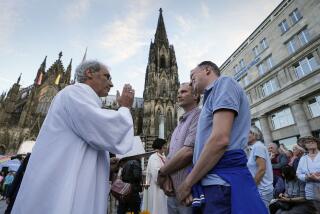Catholic Group Will Back Act on Religious Freedom
WASHINGTON â After two years of opposition, the U.S. Catholic Conference said Wednesday it will support the Religious Freedom Restoration Act.
The change virtually ensures swift passage of the proposed act, which is at the top of the agenda of most religious and civil liberties lobbyists in Washington.
The U.S. Catholic Conference, based here, is the social policy arm of the National Conference of Catholic Bishops.
The shift occurred after Catholic leaders became convinced that the proposed law could not be used to promote a religious right to abortion and would not change government law on tax exemptions and funding for organizations with religious ties, such as hospitals and schools.
In a letter Tuesday, Frank Monahan, director of the conferenceâs Office of Government Liaison, told Sen. Edward M. Kennedy (D-Mass.) that the conference supports passage of the bill.
âIâm delighted that the U.S. Catholic Conference has agreed to join the broad coalition which has seen the Religious Freedom Restoration Act as the best hope for beginning to restore religious liberty through our court system,â said Barry Lynn, head of Americans United for Separation of Church and State, one of the major groups supporting the bill.
The bill would overturn the key element in the Supreme Courtâs so-called âpeyote ruling,â handed down in 1990. In the ruling, which involved ceremonial use of peyote by members of a Native American church, the court said the government would no longer be required to show a âcompelling interestâ in restricting free exercise of religion.
The ruling sent shock waves through the religious and civil liberties communities by greatly broadening governmentâs power to restrict or control a large variety of religious practices.
A broad-based coalition, ranging from the American Civil Liberties Union and the National Council of Churches to the National Assn. of Evangelicals and the Christian Life Commission of the Southern Baptist Convention, moved quickly to back remedial legislation on Capitol Hill.
But opponents feared that the new legislation would establish religious grounds for a right to abortion, a fear dismissed by the billâs backers. Opposition from the bishops and the National Right to Life Committee blocked passage of the legislation for more than two years.
Tuesdayâs letter to Kennedy culminated months of maneuvering by both sides. It was aimed at finding language that would preserve the billâs intent and allow Catholics to back the measure.
The switch by the bishops was prompted by the addition of a sentence to the bill clarifying that it would not affect âgovernment funding, benefits or exemptions.â
In addition, the legislative report, but not the bill, will include a statement that the bill is neutral on the question of abortion and, in Monahanâs words, âdoes not expand, contract, or alter in any wayâ religious claims to abortion rights.
Supporters maintain that such a statement is unnecessary and irrelevant in light of a Supreme Court ruling last year in a Pennsylvania abortion, Planned Parenthood vs. Casey. The court ruled that abortion remains a secular right.
Monahan, agreeing that Casey changed the abortion landscape, said he had been reassured by members of the coalition and by sponsors of the legislation that they did not intend it to be used to support abortion. Still, he said, the new language âis helpful in explaining this intent.â
âI expect the legislation to move very quickly, both in the House and Senate,â said Bob Peck, legislative counsel for the ACLU and a leader in the coalition promoting the bill.
More to Read
Sign up for Essential California
The most important California stories and recommendations in your inbox every morning.
You may occasionally receive promotional content from the Los Angeles Times.










